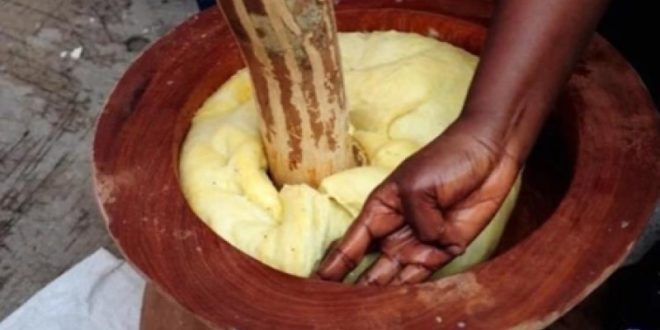In Caribbean nations with substantial populations of West African origin, such as Cuba, Jamaica, the Dominican Republic, Haiti and Puerto Rico, plantains, cassava or yams are mashed with other ingredients.
In Cuba, the dish retains its original African stem name, termed simply as fufú or with added descriptive extensions like fufú de plátano or fufú de plátano pintón. On other major islands, fufú goes by the names of mangú in the Dominican Republic, mofongo and funche in Puerto Rico. What distinguishes the Caribbean “fufú” from its West African relative is a firmer texture with stronger flavors. As it moves away from Cuba, the fufú’s core is less a gelatinous dough and more of a consistent mass.
In Haiti it is called tonm tonm and Foofoo. It is mostly made of breadfruit but can be made of plantain or yams and is usually served with an okra based stew or soup. It is primarily consumed in the southernmost regions of Haiti namely the Grand’Anse and Sud departments. The city of Jérémie is regarded as the tonmtonm capital of Haiti.
Puerto Rican mofongo, in keeping with the creolized cuisine traditions of the Caribbean, tends toward a fufú of much higher density and robust seasoning. While keeping a conspicuous African character, mofongo has borrowed from the island’s Iberian culinary tradition, to create a dish made of fried green and yellow plantains, cassava or breadfruit. Unlike the mushier Caribbean and West African fufús, mofongo is generally firmer and crustier.
To prepare mofongo, green plantains are deep-fried once unlike twice fried tostones. Next, they are mashed in a ‘pilon’ (mortar) with chopped garlic, salt, black pepper and olive oil. The resulting mash is then pressed and rounded into a hollowed crusty orb. Meat, traditionally chicharrón, is then stuffed into the chunky ball of fried green plantains.
A few recipes call for a meat or vegetable salsa criolla” (related to American Creole sauce) poured on top of the hot sphere. In the trendier “mofongo relleno”, typical of western Puerto Rico, seafood is all over, inside and outside. Traditional mofongo, as previously cited, comes seasoned and stuffed with meat and bathed in a chicken broth soup.
Because of its elaborate process of preparation and its sundry ingredients, poet and blogger Arose N Daghetto called the mofongo a type of “fufú paella” and branded it as “the big daddy of fufús”.
Although mofongo is associated with being fried, boiled and roasting plantain mofongo predate fried mofongo and is still excited but a rare find in Puerto Rico. A dish called funche made with taro, green and yellow plantains boiled and mashed with butter, garlic, and pork fat was once popular in Puerto Rico.
Once mashed it was formed into balls and eaten with broth made from sesame seeds. Funche is written in early Puerto Rican cookbooks around the 1800s, but can probably be traced back to African slaves on the island. Funche today in Puerto Rico is cornmeal cooked in coconut milk and milk.
The vegetable or fufú sauce in the Anglo-Caribbean is not fried first. Plantain is not used as much, as it is used in so many dishes. Fufu is usually part of, or added to, a soupy sauce or on the side with a soupy dish.
In Antigua, fufu is served as part of the national dish but is called fungi/fungee and is made using cornmeal and okra. Similarly, in Barbados it serves as part of the national dish and is called cou-cou and uses cornmeal or, less commonly, breadfruit instead, like several other English Caribbean islands.
Note: Part of this content were shared by Wikipedia’s Representative;
Source: Thepressradio.com|Healthshorts| Ogyem
 Home Of Ghana News Ghana News, Entertainment And More
Home Of Ghana News Ghana News, Entertainment And More





